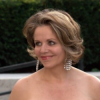Renee Fleming

Renee Fleming
Renée Flemingis an American opera singer and soprano whose repertoire encompasses Richard Strauss, Mozart, Handel, bel canto, lieder, French opera and chansons, jazz and indie rock. Fleming has a full lyric soprano voice. She has performed coloratura, lyric, and lighter spinto soprano operatic roles in Italian, German, French, Czech, and Russian, aside from her native English. She also speaks fluent German and French, along with limited Italian. Her signature roles include Countess Almaviva in Mozart's Le nozze di Figaro, Desdemona...
NationalityAmerican
ProfessionOpera Singer
Date of Birth14 February 1959
CountryUnited States of America
I think opera has gained a kind of glamorous appeal. It's a live performance that aligns all of the arts, and when it is represented in the media, in film in particular, it is presented as something that is really a special event, whether it's a great date or something that's just hugely romantic.
I think singing it when its done well is extremely natural. It feels great.
I think singing is one of the most natural things that human beings do, but it's difficult.
There's no performance where I never have to think about setting up a phrase or making a technical adjustment while I'm performing.
Learning operatic roles is ongoing, and I find that I can learn on the train or subway, during a manicure, getting my hair done, and even while driving if I only look at the score at red lights.
Some of my first teachers were incredibly tough. You could never sing more than three words without being stopped and having to do it over 20 times. I loved that - that sort of process of dissecting and trying to figure out and master this incredibly mysterious instrument.
He coached and prepared me for a 'Rosenkavalier' scenes program,
Well, any time I'm preparing for a performance or even a rehearsal, it's as if in a way, like any other athletes, these are muscles that support the vocal cords which are just I believe cartilage. It demands a kind of constant warming up and a constant feeling of where is the voice today.
My philosophy is that the people around us are there doing as much work if not more work behind the scenes and they're the last people you would ever be unkind to, so I hope I'm not a diva off stage.
When I sing, the sound is a totally different range, color, all of it. It's all about the breath. You take in a breath and you make a sound.
I haven't really been able to transfer into that extraordinarily other worldly creature, other than I hope on stage.
A lot of bad behavior in singers is caused by nerves.
My whole career I played these girls sort of 18 to 23.
I was constantly being pushed toward a European ideal of what it means to be a classical or opera singer, let's say in the Renata Tebaldi mode. I reject that.